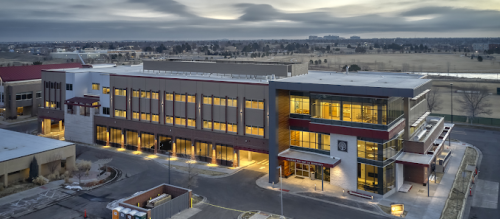






Eating Recovery Center Denver
Verified Center
This provider's information has been quality-checked by Recovery.com's Research Team for accuracy and completeness, including center verification through appropriate third-party organizations.
Treatment Focus
You can get treatment for eating disorders at this center, helping you navigate symptoms, build coping tools, and restore your physical health under expert care.
Primary Level of Care
Offering intensive care with 24/7 monitoring, residential treatment is typically 30 days and can cover multiple levels of care. Length can range from 14 to 90 days typically.
Treatment Focus
You can get treatment for eating disorders at this center, helping you navigate symptoms, build coping tools, and restore your physical health under expert care.
Primary Level of Care
Offering intensive care with 24/7 monitoring, residential treatment is typically 30 days and can cover multiple levels of care. Length can range from 14 to 90 days typically.
Provider's Policy
We are in-network with most insurances. We do not take Medicaid or Medicare. To ensure you can pursue recovery, our dedicated team will work on your behalf by acting as a liaison with your insurance provider, answering your questions, and providing guidance and support every step of the way.
Eating Recovery Center Denver
Eating Recovery Center Denver
About Eating Recovery Center Denver
Located in Denver, The Eating Recovery Center offers specialized residential treatment for adult clients with eating disorders and co-occurring mental health issues. The center focuses on individualized care by using evidence-based treatment methods to support patients in achieving long-term recovery. Their expert team of licensed therapists is dedicated to helping clients overcome eating disorders and co-occurring conditions in a supportive environment.
Comprehensive Tailored Treatment
The Eating Recovery Center uses a holistic and personalized approach to treat eating disorders, combining medical, psychological, and nutritional support. This treatment center provides healing for adults who struggle with anorexia, ARFID, binge eating disorder, bulimia, compulsive overeating, orthorexia, and other specified feeding and eating disorders. The Eating Recovery Center’s staff are trained on the most up-to-date and evidence-based therapies to address complex cases. The center is fully equipped to provide these services if clients require medication management and psychiatric supervision.
Lighting the Way to Recovery
At The Eating Recovery Center, the treatment focuses on building coping skills and whole-person support. The clinicians use nutritional rehabilitation, radically open dialectical behavior therapy, exposure therapy, acceptance and commitment therapy, dialectical behavior therapy, and cognitive behavioral therapy to help clients build resilience, navigate stress, and create lasting connections with others. Additionally, they offer group therapy, nutritional counseling, and family therapy to deepen each client’s recovery experience.
State-of-the-Art Facilities and Aftercare Program
The Eating Recovery Center in Denver is a 62,000 square-foot, 72 bed facility offering a supportive environment. Clients can benefit from comfortable amenities and services, including natural light, quiet therapy spaces, art groups, nutritional counseling, and family education. Clients see the same clinician as they move from residential to outpatient treatment, making for a smooth and cohesive transition.
The aftercare program for alumni provides ongoing support through resources like virtual support groups, community events, and periodic follow-up appointments to ensure that clients feel supported after discharge.

Highlights from the Center
Highlights
These highlights are provided by and paid for by the center.
Eating Disorders Program
Center Overview
Treatment Focus
You can get treatment for eating disorders at this center, helping you navigate symptoms, build coping tools, and restore your physical health under expert care.
CARF Accredited
CARF stands for the Commission on Accreditation of Rehabilitation Facilities. It's an independent, non-profit organization that provides accreditation services for a variety of healthcare services. To be accredited means that the program meets their standards for quality, effectiveness, and person-centered care.

Insurance Accepted
Cash Pay Rates
Estimated Cash Pay Rate
Center pricing can vary based on program and length of stay. Contact the center for more information. Recovery.com strives for price transparency so you can make an informed decision.




Levels of Care




Your Care Options
Specializations
Co-Occurring Disorders
A person with multiple mental health diagnoses, such as addiction and depression, has co-occurring disorders also called dual diagnosis.
Eating Disorders
An eating disorder is a long-term pattern of unhealthy behavior relating to food. Most people with eating disorders have a distorted self-image.
Who We Treat
Men and Women
Men and women attend treatment for addiction in a co-ed setting, going to therapy groups together to share experiences, struggles, and successes.
Approaches
Holistic
A non-medicinal, wellness-focused approach that aims to align the mind, body, and spirit for deep and lasting healing.
Evidence-Based
A combination of scientifically rooted therapies and treatments make up evidence-based care, defined by their measured and proven results.
Individual Treatment
Individual care meets the needs of each patient, using personalized treatment to provide them the most relevant care and greatest chance of success.
Therapies
1-on-1 Counseling
Patient and therapist meet 1-on-1 to work through difficult emotions and behavioral challenges in a personal, private setting.
Family Therapy
Family therapy addresses group dynamics within a family system, with a focus on improving communication and interrupting unhealthy relationship patterns.
Acceptance and Commitment Therapy (ACT)
This cognitive behavioral therapy teaches patients to accept challenging feelings and make the appropriate changes to reach personal goals.
Art Therapy
Visual art invites patients to examine the emotions within their work, focusing on the process of creativity and its gentle therapeutic power.
Trauma-Specific Therapy
This form of talk therapy addresses any childhood trauma at the root of a patient's current diagnosis.
Nutrition Counseling
Nutritious food helps patients heal from within, setting them up for mental and bodily wellness as they learn about healthy eating.
Conditions We Treat
Eating Disorders
An eating disorder is a long-term pattern of unhealthy behavior relating to food. Most people with eating disorders have a distorted self-image.
Substances We Treat
Co-Occurring Disorders
A person with multiple mental health diagnoses, such as addiction and depression, has co-occurring disorders also called dual diagnosis.
Languages
Aftercare
Care Designed for Your Needs
Personal Amenities
Amenities
Special Considerations
Activities
Yoga
Yoga is both a physical and spiritual practice. It includes a flow of movement, breathing techniques, and meditation.






